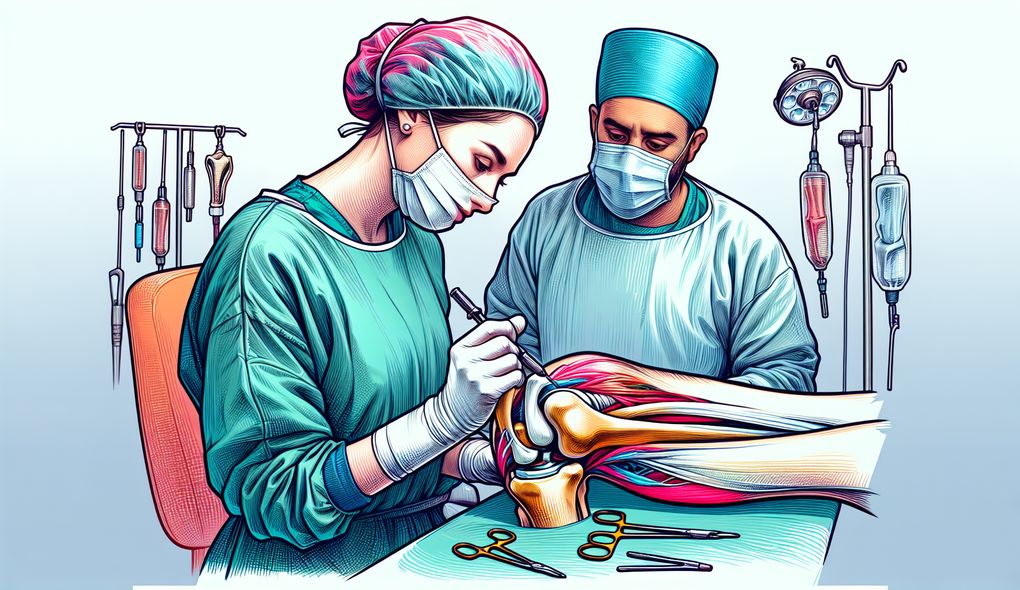How do you stay current with advancements in joint replacement surgery and incorporate new techniques as appropriate?
SENIOR LEVEL

Sample answer to the question:
To stay current with advancements in joint replacement surgery, I make it a priority to attend conferences and workshops related to my field. These events provide valuable opportunities to learn about new techniques and technologies. In addition, I regularly read medical journals and research articles to stay up-to-date with the latest advancements in joint replacement surgery. Incorporating new techniques is crucial for providing the best possible care to my patients. Whenever I come across a new technique or technology that shows promising results, I evaluate its potential benefits and risks. If I believe it will be beneficial for my patients, I integrate it into my practice after thoroughly studying and training in the new technique.
Here is a more solid answer:
To stay current with advancements in joint replacement surgery, I employ a multi-faceted approach. Firstly, I actively participate in conferences and workshops that focus on joint replacement surgery. These events not only provide opportunities to learn about the latest techniques but also allow me to engage with experts in the field and exchange knowledge and experiences. Additionally, I subscribe to several medical journals and regularly read research articles to stay abreast of new developments. I am also a member of professional associations and online forums where orthopedic surgeons discuss advancements and share insights. Furthermore, I continuously seek out training programs and courses to enhance my skills and knowledge. Whenever I come across a new technique or technology, I evaluate its efficacy and benefits through comprehensive literature review and consultation with colleagues. If I believe it can improve patient outcomes, I integrate it into my practice after receiving appropriate training and ensuring patient safety. Continuous learning and improvement are at the core of my practice, and I am dedicated to providing the most advanced and effective treatments for my patients.
Why is this a more solid answer?
The solid answer includes specific examples and demonstrates a deeper commitment to continuous learning and improvement. It showcases the candidate's active participation in conferences and workshops, engagement with experts, subscription to medical journals, and membership in professional associations. The candidate also emphasizes the importance of comprehensive evaluation and patient safety when incorporating new techniques.
An example of a exceptional answer:
As a Joint Replacement Orthopedic Surgeon, I am deeply committed to staying at the forefront of advancements in my field and delivering the highest level of care to my patients. To ensure I stay current with joint replacement surgery advancements, I maintain strong relationships with leading experts through my active involvement in national and international orthopedic associations. Attending their annual conferences and seminars allows me to learn directly from pioneers in the field and gain insights into the latest surgical techniques and technologies. In addition, I have cultivated a network of colleagues who share their experiences and updates, forming a collaborative environment for learning and professional growth. To complement this, I continuously engage in self-directed learning by constantly reviewing reputable medical journals, such as the Journal of Orthopedic Surgery and The Bone & Joint Journal. This allows me to stay informed about cutting-edge research findings and evidence-based practices. Furthermore, I consistently seek out advanced training opportunities, such as specialized courses and workshops, to enhance my surgical skills and expand my repertoire of techniques. Before incorporating new techniques, I conduct thorough evaluations, carefully considering the evidence, patient outcomes, and any potential risks. I also consult with my colleagues and seek their guidance to ensure the best possible patient care. By adopting a proactive approach to continuing education and collaboration, I strive to provide the most advanced, effective, and safe joint replacement procedures for my patients.
Why is this an exceptional answer?
The exceptional answer goes above and beyond by highlighting the candidate's active involvement in national and international orthopedic associations and their direct learning from pioneers in the field. The candidate also emphasizes the cultivation of a network of colleagues and the importance of self-directed learning through reputable medical journals. Additionally, the candidate's commitment to seeking out advanced training opportunities demonstrates a strong dedication to continuous improvement. The thorough evaluations and collaboration with colleagues further reinforce the candidate's focus on patient safety and delivering the best possible care.
How to prepare for this question:
- Stay updated with the latest research findings and advancements in joint replacement surgery by regularly reading reputable medical journals, such as the Journal of Orthopedic Surgery and The Bone & Joint Journal.
- Actively participate in conferences, seminars, and workshops related to joint replacement surgery to learn from experts in the field and stay informed about the latest techniques and technologies.
- Join national and international orthopedic associations to access valuable resources, networking opportunities, and professional development events.
- Build a network of colleagues who are also interested in staying current with joint replacement surgery advancements. Share knowledge, experiences, and updates to foster a collaborative learning environment.
- Seek out advanced training opportunities, such as specialized courses and workshops, to enhance surgical skills and expand the repertoire of techniques.
- Conduct thorough evaluations and consider the evidence, patient outcomes, and potential risks before incorporating new techniques into practice. Consult with colleagues and seek their guidance to ensure the best possible patient care.
What are interviewers evaluating with this question?
- Knowledge of advancements in joint replacement surgery
- Ability to incorporate new techniques
- Commitment to continuous learning and improvement

